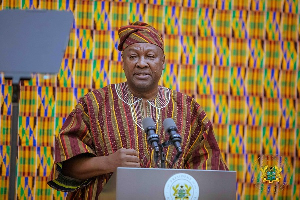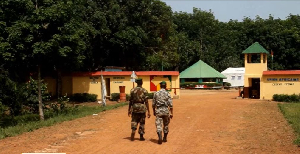By Dr. Michael J.K. Bokor
E-mail: mjbokor@yahoo.com
July 6, 2010
Some may describe Charles Kofi Wayo as a “maverick politician”; but he cares less. For one thing, he is known for his scathing verbal attacks on anybody he sees as falling short of the standards that he upholds. He first entered Ghanaian politics on the ticket of the NPP with bitter criticisms and open insults against Jerry Rawlings and his government; then, he turned his verbal dagger against Kufuor and his NPP government before emerging with his unsuccessful United Renaissance Party. President Mills’ NDC government has garnered some favourable comments from him, although he maintains his dagger-in-cloak posture. Now, Kofi Wayo has taken the fight to Parliament and made bald pronouncements that some have considered as hurtful to the image of Parliament. Certainly, by making such pronouncements, Kofi Wayo has pushed himself and Parliament on a collision course. A big bang is in the offing.
As is to be expected Members of Parliament are smarting under his brazen pronouncements and have started sharpening their teeth to bite deep into his flesh. The MPs are once again seeking to bully such a critic by using the Privileges Committee of Parliament for that purpose. In effect, this Committee will perform its role as a political Sanhedrin to clip the wings of a critic. We have a peculiar problem in our Parliament. Once again, indications are clear that our Parliament is gradually emerging as a problem that we have to solve if our democracy is to make the expected progress. That is the import of Kofi Wayo’s pronouncements. I agree with him.
There is no justification for the MPs to attempt intimidating Kofi Wayo or anybody who criticizes them on the basis of any reprehensible conduct, be it in their personal capacities as individuals who have failed to uphold and to demonstrate the tenets of good citizenship or in their attitude to official Parliamentary business if that attitude is uncongenial and draws attention to itself. There is no doubt in my mind that our crops of MPs since the inception of this 4th Republic have given cause for concern at both levels. Why, then, shouldn’t any citizen in good status (a legitimate tax-paying and law-abiding Ghanaian) take them to task if they create room for it?
The truth may hurt our MPs but they need to know that they are the cause of their own woes. Since its inception, Ghana’s 4th Republican Parliament has come under the spotlight for various reasons, some of which Kofi Wayo boldly raised in his utterances. For the avoidance of any doubt, some of the issues that have created a bad name for Parliament are already in the public domain. Kofi Wayo has only reiterated them and that bold assertion doesn’t warrant any draconian measure as the MPs may be contemplating. The misconduct of our MPs can be identified along two main lines—internal and external.
Internally, happenings in Parliament have given little hope to Ghanaians that their MPs are in for serious business to play their statutory role of cleaning the legal stables and enacting appropriate laws to take care of the ills of our society. Here are some of them:
1. In the conduct of official Parliamentary business, our MPs have not performed as assiduously as expected to enact laws that are needed at this time of the country’s growth and search for equity in the administration of affairs to benefit the ordinary Ghanaian tax-payers. They are seen as more interested in working hard for their own privileges. Take, for instance, the alacrity with which they grabbed the $50,000 car loans that President Mills’ government gave them or what previous governments had doled out to MPs. And they are not telling us how they are making good these loans!!
Again, let’s consider the dishonesty that our MPs displayed in the handling of the end-of-service package that the Chinery Hesse Commission gave Kufuor and them, which provoked angry outbursts and threats from them, especially when President Mills (and millions of Ghanaians) rejected that outrageous package. Having succeeded in getting their share of the package on the quiet, what impression do these MPs think that Ghanaians will have of them? Moreover, knowing very well that the Rawlings government abolished the payment of end-of-service benefits to Ghanaian workers in the public sector, what justification do they have to enjoy ESB without fighting for the restoration of same for other workers?
Again, let’s consider the poor service conditions for MPs’ drivers and their open display of anger as against the sumptuous benefits that the MPs enjoy, which attracted public attention recently. None of the MPs rose up to support the drivers’ call for better service conditions.
This self-centered approach to tackling problems doesn’t satisfy the ordinary tax-payers whose sweat and toil provide the funds and logistics which support the institutions of state (including Parliament).
Now, a TV channel is to be established with official funds for Parliament to air its proceedings, which will make the people more interested in the happenings in Parliament. Shouldn’t they comment on how their MPs conduct affairs, especially if they don’t like anything therefrom?
2. The Right to Information Bill is slowly but surely grinding out of public interest because Parliament is not doing anything specifically encouraging to enact it into a law, almost two years since promises were made on it;
3. Unproductive partisan approach to important national issues and useless actions resulting in boycott or walkouts that have ended up irritating the people;
4. Ridiculous shouting matches indulged in amid accusations and counter-accusations of impropriety by either side NDC/Opposition MPs), which sometimes turns Parliamentary business into a horse trade to the chagrin of the tax-paying poor people;
5. Lack of quorum or habitual lateness to Parliament, which stalls business;
6. Triviliazing of issues—recent noise by NPP MPs against the NDC MP who appeared in Parliament without wearing a tie and was prevented from delivering an official statement on the economy, which makes a mockery of Parliament itself;
7. Physical confrontations (e.g., NDC MP slapping a fellow NDC MP);
8. The criminal misconduct of some MPs that has tarnished the reputation of the House itself, which no sane MP will deny. Above all is the grand felony—theft of public property—that was perpetrated by the former Speaker of Parliament (Begyina Sekyi-Hughes), which is the height of misconduct by the font of authority in Parliament itself!! In reacting to this blatant instance of open thievery, some voices from Parliament were heard implying that the case should be “killed.” To date, no action has been taken to prosecute the former Speaker; but every day, we read news reports of ordinary petty plantain thieves being jailed 10 years or more!!
Among some (external) events that occurred outside Parliament and involved MPs are the following: outright criminal activities by an MP such as Eric Amoateng (cocaine trafficking for which he was convicted and jailed by a US court in November 2005); visa racketeering; the NDC MP for Sene’s criminal act of deceiving the Ghana Police Service into giving money to someone and getting his share from it; MPs inciting party functionaries and causing confusion all over the country for petty political gains; and many more. We all know how disreputable some MPs can be and must say so.
In the face of all these sordid happenings by MPs, Ghanaians are not expected to keep their mouths shut. But because the MPs have found a way to intimidate the people, they have turned the Privileges Committee of Parliament into a political Sanhedrin and quickly rush to it to do that hatchet work. Instances of such a creeping dictatorship and arm-twisting tactics by Parliament to stifle free speech or criticism, including the following, will not be countenanced:
1. Ampem Darko, the Director-General of the GBC, was hauled before this Sanhedrin of a Privileges Committee and bamboozled into submission just because he dared criticize the NPP’s K.T. Hammond over issues that he stood his grounds on. His experiences before the Sanhedrin were nasty, to say the least.
2. One journalist was also browbeaten by this same Sanhedrin and the so-called “Fear of God” pumped into him for daring to criticize some MPs;
The Sanhedrin has set itself up to confront the Executive and we are all waiting to see what happens. Alex Segbefia, Deputy Chief of Staff, was openly threatened by the NPP MPs over genuine comments he had made about their insincerity in doing partisan politics for which he was to be grilled by this same Sanhedrin. Public interest in this impending encounter has not died even though it might have ebbed somehow because of the inability of Parliament to go ahead with the intended arm-twisting. We are all waiting to see what will happen if this well-placed man in the Executive arm of government is indeed compelled to face this Parliamentary Sanhedrin. The muscles are still being flexed.
Then, this unfolding threat to take Kofi Wayo through the rough road carved by the MPs has added a new complexion to the notoriety of the Parliamentary Sanhedrin. He has dared them to go ahead to actualize their threat. Let’s see what Parliament can do; but before it even decides to take up this matter, let it be warned that it will not be allowed to misuse the power that the electorate have vested in it. Ghanaians agreed to operate this kind of democracy for reasons better than what these MPs think they are capable of doing. No one among them should think that being in Parliament gives him a blanket power to do anything with impunity. If such a person feels inflexibly hypnotized by such a political power to want to do things anyhow, he will be stopped in his stride before he endangers our democracy.
By choosing democracy, Ghanaians are more than determined to use their freedom of speech to ensure that all the institutions of state that their taxes support are subjected to constant scrutiny and criticism to keep their functionaries on their mettle. By using that approach, Ghanaians are heavily invested in how their democracy is moulded for it to yield the benefits that others elsewhere continue to derive from this manner of governance. We will not allow Parliament to arrogate to itself this kind of obsessive power to bully us. Our MPs are warned to rein in their impudence or be taught bitter lessons.
The people will continue to play their watchdog role to restrain any abuse of power and ensure that their elected representatives do not do anything to endanger the democratic experiment that has been on course since January 7, 1993. The period of senseless intimidation and wickedness in high offices is over and our MPs must come to terms with that reality. For as long as Ghanaians know that ultimate power resides in them, not their rulers, they will continue to be the masters of their own destinies.
If our MPs deceive themselves that they are the ultimate wielders of power, they will have a rude awakening sooner than later. Why do they think that they can criticize others but insulate themselves against criticism? I add my voice to that of Kofi Wayo to say that our MPs are hypocrites and self-serving people. We expect them to prove us wrong by doing the right thing instead of vainly attempting to use the lapses in the system to intimidate people and stifle criticism of their lethargy and unproductive conduct in office.
If it is open criticism that these MPs abhor, then, they are in the wrong department of national life. And for as long as they give cause for concern, we will criticize them and ensure that they don’t remain as an albatross around our necks. We are the fingers that feed them and they had better not attempt biting us; else, they will definitely suffer the unpleasant consequences of their mischief.
Opinions of Thursday, 8 July 2010
Columnist: Bokor, Michael J. K.














